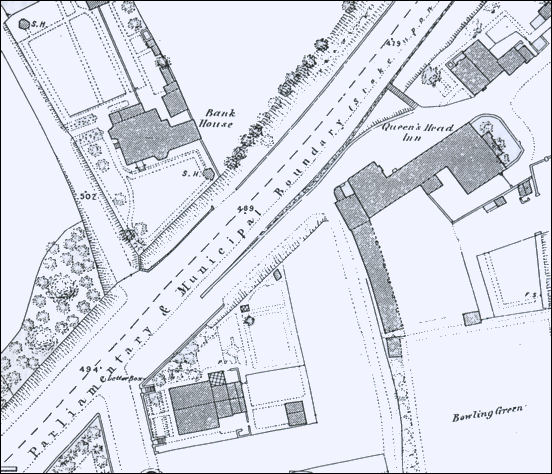|
Fowlea Bank, Basford
The Queen's:
In 1769, Robert Emery, a farmer from Derbyshire, built the what became
the "Queen's Arms" public house at the top of Fowlea Bank. (The term
"Basford Bank" did not come into general use until the beginning of the 19th
century.)
In 1795 the public house and surrounding estate were described as
"A Copyhold Estate, situate at Foley Bank,
containing about 16 Acres of land with a large and good Brick house of
three stories high, well known by the sign of the Queens Arms, Stable,
Hogsties, Ballyard, Garden and Bowling Green thereto belonging, now in
the occupation of Mr Charles Coxon, at the yearly rent of £48."
Charles Coxon was the tenant between c.1784 and 1805.
First built in 1769 and re-built in 1881 the
public house has had a variety of names over the years:
"New Inn", "Queen's Arms", "The Bowling
Green Inn", "The Belle View Inn", "The Queen's Head Inn", "The Queen's
Hotel" and now simply "The Queen's"

The Queens - 2008

1878 OS map of the
original Queen's
note the Bowling Green next to the inn
The Queens Arms
public house occupied a prominent position on the edge of the
Potteries and for that reason was a favoured meeting place for local
friendly societies.
For example, the
Staffordshire Advertiser reported in 1822 that the First Etruria Friendly
Society, consisting of 429 members......
"proceeded in the usual
manner to Basford and partook of an excellent and sumptuous dinner
provided by Mr Greaves."
(John Greaves was the
landlord between c.1810 and 1836).
The bowling green
attached to the public house also attracted a "respectable" clientele and
the season was opened by a dinner for subscribers at the public house
towards the end of May each year.
This aspect of its trade was developed by Henry Platt who became the
tenant in 1861......he renamed the pub "The Bowling Green Inn" and in
1864 he changed the name again to "The Belle View Inn."
In that year the first proper running track in the Potteries was laid
out next to the pub and a meeting organised for August consisting of a one
mile handicap open to "All England". First prize was a patent lever stop
watch, with second and third prizes being £1 and 10s respectively.
Admission to the ground was 6d and the meeting was well supported by local
people some of whom came by way of Etruria Station at the bottom of
Basford Bank.
In 1869 the public house was described as follows:
"The Premises are situated in a most healthy neighbourhood, on an
elevation, commanding a large and beautiful view. The House contains two
vaults, one 90 feet long, smoke room, tap room, large kitchen, two
cellars, and room for storage of 200 barrels of ale, a large club room
upstairs, and seven bedrooms. There is close to the house a boarded
recreation ground, bowling green, about six acres of pasture land, a
large banqueting hall, dancing platform and orchestra. Good stabling.
Dinners and teas have been provided for parties residing at a distance
to the number of four or five thousand persons, and entire satisfaction
given in all instances."
In 1873 Henry Platt left to take over the Rudyard Lake Hotel and five
years later the public house and adjacent property were bought by Henry
Parker for £8,500.
His company, Parkers Burslem Brewery Company, rebuilt the public house
(around 1881) renaming it "The Queens Hotel".
The company also erected 6 houses known as "Bell Vue Terrace" on
Etruria Road in 1887, and 14 houses known ass "Parkers Terrace" in Brick
Kiln Lane. The latter development was demolished during the construction
of the A500.
Andrew Dobraszczyc's notes
|